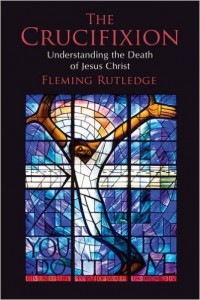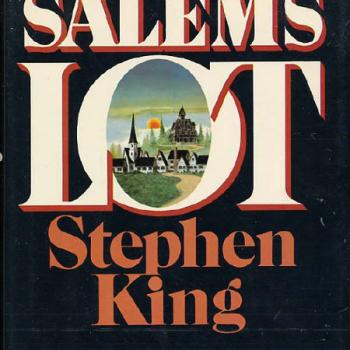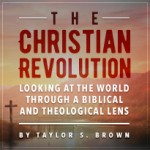In between papers and readings for a January-term intensive class, I’ve been slowly working my way through Fleming Rutledge’s mammoth book The Crucifixion: Understanding the Death of Jesus Christ (Eerdmans, 2015). Arguably Rutledge’s magnum opus, this book has received extremely high critical praise over the last year (it came out near the end of 2015). It even won the coveted “Book of the Year Award” from Christianity Today.

I’m only about 150 pages in, but so far it is living up to the hype. One of the greatest things that Rutledge does (at least so far) in the book is bring readers back to the core reasons why the crucifixion was necessary. Indeed, she shows why—contrary to many popular neo-Abelardian and Girardian atonement theories (if you don’t know what those are, don’t worry about it)—the substitutionary death of Christ was necessary to rectify the problem of Sin (Rutledge, consciously writing within the Barthian/Apocalyptic tradition, capitalizes the “s” in Sin to illustrate its reality as a power that has enslaved the world) and bring humanity into right relationality with God.
It has become popular in many modern and post-modern theological circles to shy away from speaking of the substitutionary nature of Christ’s crucifixion. Rutledge, thankfully, does not shy away though. She is adamant in saying that we as Christians must hold together the realities of divine justice and divine redemption that are manifested in Christ’s cross. Indeed, Rutledge sounds the necessary call to reclaim the proper understanding of divine wrath:
“The biblical message is that the outrage [about the evils and injustices of the world] is first of all in the heart of God. If we are resistant to the idea of the wrath of God, we might pause to reflect the next time we are outraged about something — about our property values being threatened, or our children’s educational opportunities being limited, or our tax breaks being eliminated. All of us are capable of anger about something. God’s anger, however, is pure. It does not have the maintenance of privilege as its object, but goes out on behalf of those who have no privileges. The wrath of God is not an emotion that flares up from time to time, as though God had temper tantrums; it is away of describing his absolute enmity against all wrong and his coming to set matters right.” (pp. 129-30)
In reclaiming the classical concepts of divine wrath and justice, Rutledge calls her readers to a more full-orbed view of Christ’s cruciform atonement. Indeed, the atonement is supreme forgiveness, but not a forgiveness that excludes righting the wrongs and evils that have been wrought upon God’s good world:
“The New Testament scholar Reginald Fuller wrote that ‘forgiveness is too weak a word’ to embrace the full scope of what Christ has done and what he calls us to. How can we begin to speak even of forgiveness, let alone transformation, in the worst of the worst situations? The extermination of millions does not cry out for forgiveness. Never mind millions; what about just one baby burned up in a microwave oven by its own father? ‘After such knowledge, what forgiveness?’ [T. S. Eliot, ‘Gerontion]. Forgiveness is not enough. There must be justice too. . . Forgiveness is not enough. Something is wrong and must be made right. Miroslav Volf concurs: ‘The cross is not forgiveness pure and simple, but God’s setting aright the world of injustice and deception” … “The incarnation of the Son of God should not be understood as the divine benediction on all that is. It was an incarnation unto the cross, and therefore an incarnation that sets a question mark over against the way things are. . . The Messiah came, not to a purified and enlightened world spiritually prepared for his arrival, but rather to a humanity no nearer to its original goodness than on the day Cain murdered his brother Abel. Indeed, the barbarity of crucifixion reveals precisely that diagnosis. From beginning to end, the Holy Scriptures testify that the predicament of fallen humanity is so serious, so grave, so irremediable from within, that nothing short of divine intervention can rectify it.” (pp. 126-27)
Rutledge’s book, and the vision of a classical, full-orbed view of the Christ’s atoning death that she puts forward, is a Godsend in the world we live in. Increasingly, we look around at a world that seems to cry out for justice and the rectification of horrendous evils. The horror that we so often refuse to admit though, is that each and every one of us has perpetrated or contributed to such injustices. We look out in the wake of our disillusionment with both modernity and post-modernity—at unborn lives being snuffed out, at refugees being denied safety, at our leaders seeking to use torture and so become like the enemies we fight—and we cry “Something is desperately wrong in our world, something that we, despite our best efforts, cannot set right.”
What Fleming Rutledge calls us to in her book is a reminder of our powerlessness against Sin. On our own, we cannot fix the problems in our own hearts, let alone the systemic problems of the world. It is only by the power of God that the world can be ultimately set right. What Rutledge reminds us is that this divine rectification looks like a crucifixion and a resurrection.












